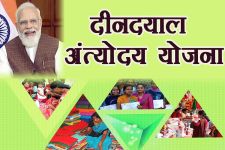Need of strengthening SHG-led FNHW interventions Stressed
Published: Jul 03, 2025

By TIOLCorplaws News Service
NEW DELHI, JULY 03, 2025: THE Deendayal Antyodaya Yojana - National Rural Livelihoods Mission (DAY-NRLM), Ministry of Rural Development (MoRD), Government of India, in collaboration with the State Rural Livelihoods Mission (SRLM), Meghalaya, organized a two-day Regional Workshop titled "Sangathan, Swasthya, Samriddhi: Women Collective's Action on Food, Nutrition, Health & WASH (FNHW)" on June 30th and July 1st, 2025 at Shillong, Meghalaya.
The workshop aimed to strengthen SHG-led FNHW interventions, encourage cross-learning among states, and showcase community-driven models from across India. It focused on integrating FNHW activities within the DAY-NRLM framework, fostering partnerships with line departments, Civil Society Organizations and amplifying field insights to shape inclusive and sustainable policies.
The event was graced by N.N. Sinha, Former Secretary, Government of India; Smriti Sharan, Joint Secretary, Ministry of Rural Development; Sibhy C. Sadhu, Director, C&RD Meghalaya and Ramakrishna Chitturi, CEO, SRLM Meghalaya. Senior officials from MoRD, State Mission Directors, CEOs, COOs, and FNHW State In-Charges, along with CLF leaders and CRPs from 16 states - Andhra Pradesh, Arunachal Pradesh, Assam, Goa, Karnataka, Kerala, Manipur, Mizoram, Nagaland, Odisha, Sikkim, Tamil Nadu, Telangana, Tripura, West Bengal, and Meghalaya participated in the workshop.
On the first day, field visits were conducted in Laitkroh and Bholaganj Blocks, East Khasi Hills District, where delegates interacted with CLFs, SHGs, and Community Gender & Health Activists (CGHAs). Participants observed community-run transit homes promoting institutional deliveries, interacted with Lakhpati Didi involved in multiple livelihood activities, visited CLFs showcasing collective solutions to local challenges, Baby shower demonstrations and Agri-Nutrition Gardens led by women collectives, providing firsthand experience of community-based innovations. The second day featured an inaugural session with dignitaries, launch of uniform for CGHAs symbolizing strong visual identity and unified commitment to advancing community health and gender equity, experience-sharing by SRLMs, reflections from CRPs, and a panel discussion on state-specific FNHW initiatives. An exhibition displaying FNHW practices, products and IEC materials curated and explained by CRPs and community leaders enabled rich cross-learning among SHGs, federation cadres, MoRD, state officials, and sector experts. N.N. Sinha emphasized the need to prioritize human development over infrastructure in achieving Viksit Bharat. He lauded SHGs' role in last-mile service delivery and behavioural change and called for increased investment in preventive health, especially for vulnerable groups.
Smriti Sharan commended CGHAs as "warriors in purple capes," highlighting their leadership in maternal and child health. She stressed the importance of convergence, frontline role clarity, and scaling FNHW efforts across SRLMs. Ramakrishna Chitturi spoke of Meghalaya's journey from crisis to transformation through community-led innovations like SHG-run transit homes and VO-managed VRFs. He attributed a 91 percent decline in SAM cases to consistent convergence and local leadership. Sibhy C. Sadhu noted that while Meghalaya is matrilineal, decision-making often remains male-dominated. He underlined the importance of women's reservations and participation in governance through platforms like FNHW. Kuntal Moni Sarmah Bordoloi, SMD, Assam SRLM, shared Assam's Dasasutra-based strategy built on SHG-led capacity building, SBCC, and convergence. He highlighted innovations such as matka incinerators, tobacco-free village drives and breastfeeding corners. Assam reported an 88% reduction in child marriage and a 33 percent drop in maternal mortality and aims to scale its Sanjog Setu convergence model.
Smti. Rosetta Mary Kurbah, Deputy Commissioner, East Khasi Hills, shared the district's decentralized and convergent model for improving maternal and child health. Key initiatives included breastfeeding huts, SHG-run crèches, Agri-Nutrition Gardens, and targeted support to SAM children. Notable progress was seen in increased institutional deliveries and reduced maternal and infant deaths. Community Resource Persons (CRPs) shared inspiring stories of leading FNHW awareness, strengthening VHSNCs, and promoting Agri-Nutri Gardens across SHG households. Through local campaigns, school-based learning models, and partnerships on waste management, they are driving behavioural change and improving service uptake. Their efforts reflect how SHG-led initiatives are creating healthier, more empowered, and climate- conscious communities.
The SRLM panel discussion emphasized how integrating FNHW within SHG-led livelihoods ensures both economic and health gains, as seen in Nagaland's Lakhpati model. Tamil Nadu showcased nutri-enterprises, millet cafes, school nutrition programs, and convergence with health departments through women health volunteers. Tripura underlined SHG-driven health promotion, preventive care, and grassroots coordination as vital to achieving Viksit Bharat by 2047.
A session on elderly care highlighted India's rapidly aging rural population and the urgent need for social security. HelpAge India presented a community-led pyramid model using Elderly SHGs, mobile health units, and telemedicine to ensure age-specific, dignified care and inclusion. Kerala SRLM shared Kudumbashree's experience in implementing care economy models like K4 Care and Saantwanam, which create dignified jobs in health and elder care. BUDS institutions, in convergence with LSGIs, support education and livelihoods for the intellectually disabled. The STRIDE program develops assistive devices, and new initiatives were also presented to deepen care and inclusion efforts. An action plan emerging from the National Conclave on FNHW 2024 shaped through national consultations and regional workshops was discussed. Deliberations focused on embedding FNHW priorities into institutional planning, capacity building, and community platforms. States such as Assam and Kerala shared compelling models of FNHW integration and care service delivery.




